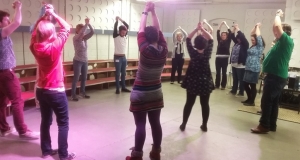 The weekend after my visit to Bristol A Cappella took me, first, down to London to work with my friends at Capital Connection. (The second part of my tour, to Norwich, follows in a subsequent post.) We were working on a contest package that they had originally planned for LABBS Convention 2016, but which they had subsequently decided needed a longer development phase, so they will be taking it to this year’s European Convention instead.
The weekend after my visit to Bristol A Cappella took me, first, down to London to work with my friends at Capital Connection. (The second part of my tour, to Norwich, follows in a subsequent post.) We were working on a contest package that they had originally planned for LABBS Convention 2016, but which they had subsequently decided needed a longer development phase, so they will be taking it to this year’s European Convention instead.
One of my hopes for this convention is that all our international visitors will think, ‘Gosh, they’re doing interesting music in LABBS,’ and Capital are contributing to this ambition with the contest premiere of an arrangement by their director Debi Cox. Coaching an arrangement directed by its arranger is strangely very like coaching any other arrangement – the same process of music analysis and performance diagnosis – except that when you point out to the singers, ‘That’s a nice bit of arranging there,’ the person you are praising actually gets to hear and appreciate the compliment.





